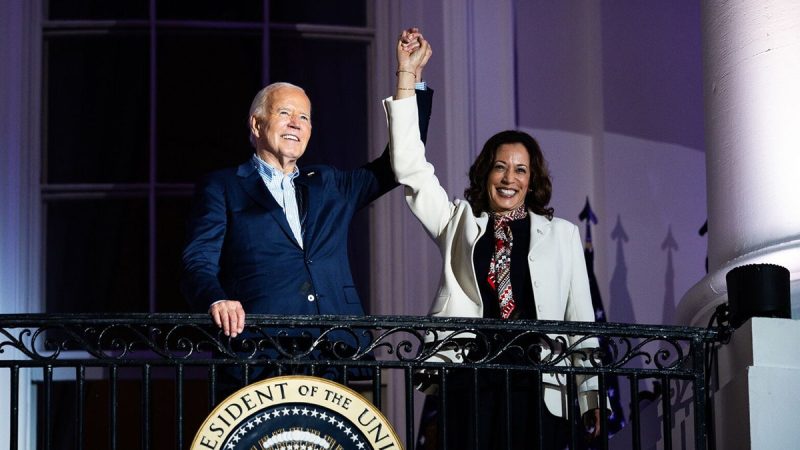With President Joe Biden stepping aside in the 2024 White House race, the question becomes who has control over, and what could be done under applicable federal campaign finance laws and regulations with, the campaign funds that have been raised by the official ‘Biden for President’ campaign committee?
As of June 20, when Biden for President filed its latest campaign report summarizing its finances through the end of May with the Federal Election Commission (‘FEC’), where I once served as a commissioner, Biden’s campaign committee had ‘cash on hand’ of $91.5 million. Here are a series of questions and answers on what can – and can’t – be done with this money.
Can his donors get their contributions back?
There is no requirement in federal law for campaign committees to provide refunds to donors who want to get their contributions returned. It would be entirely up to the Biden for President committee to decide whether it wants to provide refunds if donors request them.
If Kamala Harris becomes the Democrat Party presidential nominee, does she get access to the campaign cash?
Yes, because when the Biden for President committee filed its registration statement with the FEC, it registered itself as the ‘principal campaign committee’ for both Joe Biden and Kamala Harris.
If someone other than Kamala Harris becomes the presidential nominee, can that individual access the $91.5 million for his or her presidential campaign?
No, under FEC regulations, the new nominee would have no access to or control over the Biden for President campaign cash. Biden for President would be limited to giving no more than a $2,000 contribution to the new presidential nominee’s campaign committee.
Could the funds be transferred to the Democrat Party?
Yes, under FEC regulation 11 CFR 113.2, there is no limit on the transfer of funds from a candidate committee to party committees. Biden for President could, therefore, transfer all of its cash to the Democratic National Committee, Democratic congressional and senatorial committees, and state and local party committees, which could then use the money to support their federal, state, and local candidates. Additionally, pursuant to the regulation, it could make donations to ‘State and local candidates subject to the provisions of State law.’
However, because political party committees have expenditure limits (a vestige of the 1970s post-Watergate federal campaign finance reforms), the DNC is limited in the amount of its expenditures that it is permitted to make in coordination with the new nominee’s campaign committee.
For the 2024 campaign, the limit is $32.4 million. A party committee could make independent expenditures regarding the presidential campaign, but it could not make unlimited coordinated expenditures of the newly transferred funds.
Could the funds be used to finance a superPAC (a super political action committee)?
Yes, those funds that are transferred to the new superPAC could only be used to engage in independent expenditures without any coordination with the new nominee. As the FEC explains, superPACs cannot use their ‘funds to make contributions, whether direct, in-kind or via coordinated communications, to federal candidates or committees.’ While the DNC is permitted to make some expenditures coordinated with the new candidate, a SuperPAC can make no coordinated expenditures.
What about becoming a regular political action committee that can make contributions to candidates?
Biden for President could convert itself to a regular political action committee that is subject to federal contribution and donation limitations. But it could then only contribute $3,300 to the new presidential nominee, as FEC rules require a six-month waiting period before the new PAC qualifies to contribute at the higher ($5,000 per election) level.
Could Biden convert all the money to his own personal use?
No, federal law prohibits the personal use of campaign funds under 52 U.S.C. §30114. On the other hand, campaign committees are allowed to make charitable contributions in any amount to any organization that qualifies under 26 U.S.C. §170(c).
That federal law includes ‘religious, charitable, scientific, literary, or educational’ institutions and foundations. That means that if Joe Biden wanted to transfer (after paying off all his remaining campaign expenses) $91.5 million to the Penn Biden Center for Diplomacy & Global Engagement, he could do it.
And it should be noted that none of the funds from the campaign committee could be spent for ‘personal use’ on behalf of Biden either, as the funds retain their character as candidate funds until exhausted.
The bottom line is that, in addition to facing almost immediate deadlines to certify the name of their presidential nominee to state election officials for inclusion on the general election ballot, Democrat officials will have a potential issue in not being able to use the political contributions raised by the Biden campaign – unless Vice President Kamala Harris becomes their presidential nominee.
If it is someone else who is waiting in the wings to become the new nominee, it will be a whole new ball game when it comes to the campaign finance arena, an area fraught with legal peril and arcane restrictions that the Democrats and their leftist allies have insisted upon and imposed on campaigns, candidates and political parties for over five decades.

